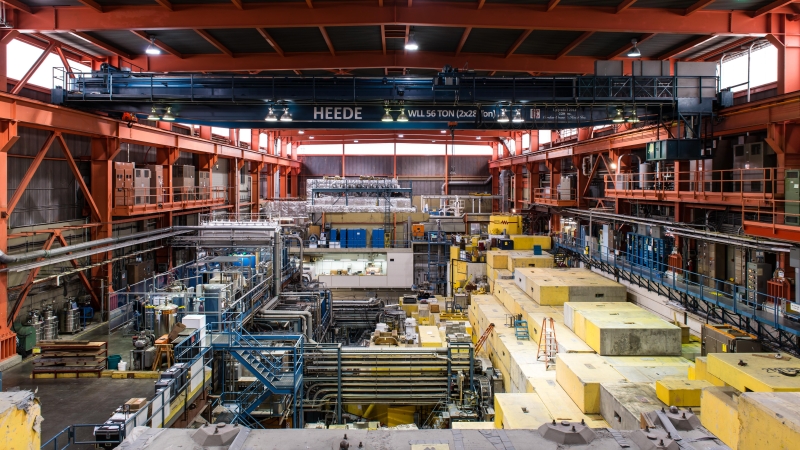UNBC becomes university member at TRIUMF
UNBC is one of seven new university members of TRIUMF, Canada's particle accelerator centre. UNBC researchers have been working on projects at the facility since 1993. Currently, UNBC is involved in a project that aims to build the world’s most advanced ultra-cold-neutron facility to carry out the world’s most precise measurement of the neutron electric dipole moment.

For nearly three decades, UNBC physics faculty, post-doctoral fellows, and graduate and undergraduate students have been collaborating with researchers from other national and international institutions to conduct research at TRIUMF in the fields of nuclear physics, nuclear astrophysics and particle physics. Now UNBC is a full member of TRIUMF after it added seven Canadian universities to its national network.
"The research conducted at TRIUMF delves into the very essence of the universe and its fundamental scientific inquiries," said UNBC Interim Vice-President Research and Innovation Dr. Kathy Lewis. "For years, UNBC researchers worked hand in hand at TRIUMF with colleagues from across the country. As a university member, we are eager to fortify and expand these partnerships for the advancement of scientific discoveries."
TRIUMF, located on the University of British Columbia campus in Vancouver, is Canada’s particle accelerator centre where programs in scientific research and education have enjoyed considerable success over the last four to five decades. These programs, which range from pure research in nuclear and particle physics to pure and applied research in life, medical, and material sciences, exploit the opportunities provided by TRIUMF’s core facilities and its synergy with the university research community. TRIUMF is a national laboratory with an excellent reputation as a world-class international user facility pushing the frontiers in research to advance science, technology, medicine, and industry.
“TRIUMF is very pleased to see such a strong response from our research communities and member universities,” said Lisa Kalynchuk, Vice-Chair, TRIUMF Board of Governors. “This shows a clear recognition of the value of TRIUMF as a national and strategic science asset today, as well as a resounding vote of confidence for the vision for TRIUMF for the next 20 years and beyond.”
UNBC’s work at TRIUMF goes back to 1993, a year before the Prince George campus was officially inaugurated. With support from the Natural Sciences and Engineering Research Council of Canada and the Canada Foundation for Innovation, UNBC researchers have worked on a number of projects carried out at just about every experimental area at TRIUMF including the so-called proton hall, meson hall, and the Isotope Separator and Accelerator (ISAC) building.
Some of the completed projects fall under the name of charge symmetry breaking (CSB) experiments which investigate the fundamental phenomenon responsible for the small mass difference between the two basic constituents of the atomic nucleus, the proton and the neutron. CSB is a crucial ingredient in understanding phenomena ranging from radioactivity to the formation of stars. These high-precision experiments took place in the proton hall using proton or neutron beams.
Another category of completed projects involved studying pion production in collisions between beams of protons or neutrons and nuclear targets. Pions are the short-lived particles responsible for the nuclear force that binds the protons and neutrons together inside the atomic nucleus. UNBC’s leadership in this type of experiments is well recognized by the subatomic physics community.
A third class of experiments studied a number of key reactions that take place inside stars as part of the nucleosynthesis process, the long series of stellar nuclear fusion reactions where the chemical elements of nature are sequentially synthesised leading to the complex world we live in and to life itself. These studies in nuclear astrophysics have taken place in the ISAC building using the so-called DRAGON facility.
TRIUMF also serves as an infrastructure base for the entire Canadian subatomic physics community including those carrying out experiments at other laboratories such as the Large Hadron Collider at CERN. Over the years, UNBC researchers have taken advantage of this and were involved in detector development, testing, and calibration studies at TRIUMF for experiments they were leading at the Saskatchewan Accelerator Laboratory in Saskatoon (now the site of the Canadian Light Source facility) and for experiments they were collaborating on at the Jefferson National Laboratory in the United States.
UNBC’s involvement at TRIUMF currently continues at the ISAC facility and with a relatively new exciting project by the TUCAN collaboration of which UNBC is a member. This project, taking place in the meson hall at TRIUMF, aims at building the world’s most advanced ultra-cold-neutron facility and carrying out the world’s most precise measurement of the neutron electric dipole moment. The ultimate goal of this measurement is to explore the possibility of the existence of new physics (new particles and/or new interactions) that could potentially permit, among other things, a resolution of the outstanding puzzle of the dominance of matter over antimatter in the universe to which we currently have no satisfactory explanation.
“In addition to research and local student training at TRIUMF, the association between UNBC and TRIUMF also involved educational support provided by TRIUMF to the UNBC physics department in the establishment of a data acquisition (DAQ) infrastructure that is routinely used in delivering an upper-level advanced physics laboratory course,” says UNBC Physics Professor Dr. Elie Korkmaz. “This support started in 1994 with the donation of valuable electronics and radiation detectors commonly used in subatomic physics experiments and culminated last year with full hardware and software upgrade of the DAQ system.”
Along with a few other Canadian universities, UNBC applied and was accepted to become an associate member of TRIUMF in 2011.This institutional membership category was eliminated last year by the Director of TRIUMF in favour of a single full membership to which UNBC was invited to apply. UNBC’s application, supported by the Office of Research and Innovation and the Physics Department, was successful.
